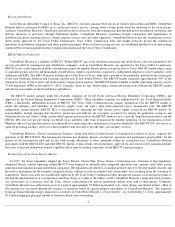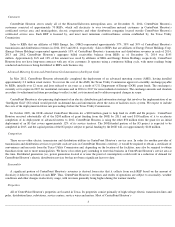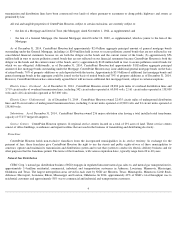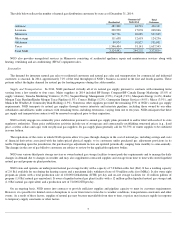CenterPoint Energy 2014 Annual Report Download - page 18
Download and view the complete annual report
Please find page 18 of the 2014 CenterPoint Energy annual report below. You can navigate through the pages in the report by either clicking on the pages listed below, or by using the keyword search tool below to find specific information within the annual report.
FERC and/or the imposition of administrative, civil and criminal penalties, as described under “— Interstate Natural Gas Pipeline Regulation”
above.
Natural Gas Gathering Pipeline Regulation
Section 1(b) of the NGA exempts natural gas gathering facilities from the jurisdiction of the FERC. Although the FERC has not made
formal determinations with respect to all of the facilities Enable considers to be gathering facilities, it believes that its natural gas pipelines meet
the traditional tests that the FERC has used to determine that a pipeline is a gathering pipeline and is therefore not subject to FERC jurisdiction.
The distinction between FERC-
regulated transmission services and federally unregulated gathering services, however, has been the subject of
substantial litigation, and the FERC determines whether facilities are gathering facilities on a case-by-
case basis, so the classification and
regulation of Enable’
s gathering facilities is subject to change based on future determinations by the FERC, the courts or Congress. If the FERC
were to consider the status of an individual facility and determine that the facility and/or services provided by it are not exempt from FERC
regulation under the NGA and that the facility provides interstate service, the rates for, and terms and conditions of, services provided by such
facility would be subject to regulation by the FERC under the NGA or the NGPA. Such regulation could decrease revenue, increase operating
costs, and, depending upon the facility in question, could adversely affect Enable’
s results of operations and cash flows. In addition, if any of
Enable’
s facilities were found to have provided services or otherwise operated in violation of the NGA or NGPA, this could result in the
imposition of civil penalties as well as a requirement to disgorge charges collected for such service in excess of the rate established by the FERC.
States may regulate gathering pipelines. State regulation of gathering facilities generally includes various safety, environmental and, in some
circumstances, requirements prohibiting undue discrimination, and in some instances complaint-based rate regulation. Enable’
s gathering
operations may be subject to ratable take and common purchaser statutes in the states in which they operate. These statutes are designed to
prohibit discrimination in favor of one producer over another producer or one source of supply over another source of supply and have the effect
of restricting Enable’s right as an owner of gathering facilities to decide with whom it contracts to purchase or transport natural gas.
Enable’
s gathering operations could be adversely affected should they be subject in the future to the application of state or federal regulation
of rates and services. Enable’
s gathering operations could also be subject to additional safety and operational regulations relating to the design,
construction, testing, operation, replacement and maintenance of gathering facilities. Additional rules and legislation pertaining to these matters
are considered or adopted from time to time. We cannot predict what effect, if any, such changes might have on Enable’
s operations, but the
industry could be required to incur additional capital expenditures and increased costs depending on future legislative and regulatory changes.
Crude Oil Gathering Regulation
Enable provides interstate transportation on its crude oil gathering system in North Dakota pursuant to a public tariff in accordance with
FERC regulatory requirements. Crude oil gathering pipelines that provide interstate transportation service may be regulated as a common carrier
by the FERC under the Interstate Commerce Act (ICA), the Energy Policy Act of 1992, and the rules and regulations promulgated under those
laws. The ICA and FERC regulations require that rates for interstate service pipelines that transport crude oil and refined petroleum products
(collectively referred to as “petroleum pipelines”) and certain other liquids, be just and reasonable and are to be non-
discriminatory or not confer
any undue preference upon any shipper. FERC regulations also require interstate common carrier petroleum pipelines to file with the FERC and
publicly post tariffs stating their interstate transportation rates and terms and conditions of service. Under the ICA, the FERC or interested
persons may challenge existing or changed rates or services. The FERC is authorized to investigate such charges and may suspend the
effectiveness of a new rate for up to seven months. A successful rate challenge could result in a common carrier paying refunds together with
interest for the period that the rate was in effect. The FERC may also order a pipeline to change its rates, and may require a common carrier to
pay shippers reparations for damages sustained for a period up to two years prior to the filing of a complaint.
For some time now, the FERC has been issuing regulatory assurances that necessarily balance the anti-
discrimination and undue preference
requirements of common carriage with the expectations of investors in new and expanding petroleum pipelines. There is an inherent tension
between the requirements imposed upon a common carrier and the need for owners of petroleum pipelines to be able to enter into long-
term,
firm contracts with shippers willing to make the commitments which underpin such large capital investments. The FERC’
s solution has been to
allow carriers to hold an “open season” prior to the in-
service date of pipeline, during which time interested shippers can make commitments to
the proposed pipeline project. Throughput commitments from interested shippers during an open season can be for firm service or for non-
firm
service. Typically, such an open season is for a 30-
day period, must be publicly announced, and culminates in interested parties entering into
transportation agreements with the carrier. Under FERC precedent, a carrier typically may reserve up to 90% of available capacity for the
provision of firm service to shippers making a commitment. At least 10% of capacity ordinarily is reserved for “walk-up” shippers.
12
























